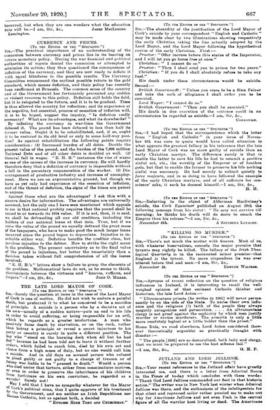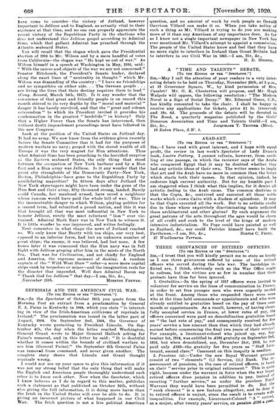SITTLAND AND LORD JELLICOE.
[To nu Emma or me " Eirsersroa."3
Sta,—Your recent references to the Jutland affair have greatly interested me, and there is a letter from Admiral Bacon in the Times of today which concludes with these words "Thank God Lord Jolliet,e commanded our fleet in that historic, action." The writer was in New York last winter when Admiral Jellicoe was there, and the enthusiasm of the inteMiteriteie for that silent and repressed sailor rather puzzled me to make out why for Americans Janie°, and not even Fools is the central figure of all Hie warrior host living or dead. The Americana
have come to consider •'the victory - of Jutland, however importantto Jellicoe and-to England, as actually vital to their existence at that time, and no one can properly appreciate the recent victory of the Republican Party in the elections who does not understand this Jellicoe gospel according to Admiral Sims, which that gallant Admiral has preached through the Atlantic seaboard States.
You will recall that the slogan which gave the Presidential election of 1916 to Mr.- Wilson and by a mere handful of votes from California—the slogan was "He kept us out of war." As Wilson himself in a speech at Washington in May, 1916, said: " With the causes and objects of the war we are not concerned." Senator Hitchcock, the President's Senate leader, declared along the exact lines of "neutrality in thought" which Mr. Wilson was demanding of the country "I have no friendships and no sympathies on either side.. . The German people . . . are living the lives that their destiny requires them to lead" (Cong. Record, March 14th, 1917). Is it any wonder that the conscience of that great and friendly people is on record this month stirred to its very depths by the "moral and material" danger it has barely survived, and that the "great and solemn referendum" to which its President invited it provides his condemnation in the greatest "landslide" in history? Only that a Higher Power than the Senate has intervened, then without doubt impeachment proceedings must have followed in the new Congress.
Look at the noSition of the United States on Jutland day. It had no army. We now know from the evidence given recently before the Senate Committee that it had for the purposes of modern warfare no navy; gorged with the stored wealth of all Eli rope it was the very magnet for Hun attentions. Thus what Admiral Sims has been preaching to the horrified surprise of the Eastern seaboard States, the only thing that stood between the occupation of New York harbour and by a Hun fleet and a Hun army was Jellicoe. Is it any wonder that the great city strongholds of the Democratic Party—New York, Boston, Philadelphia—have gone to the Republican Party by annihilating majorities? In fifteen days after Jutland the New York skyscrapers might have been under the guns of the Hun fleet and their army, fifty thousand strong, landed. Barely could Canada, her manhood armed; have saved a neighbour whoee ransom would hare paid the whole bill of war. This is ths inconceivable danger to which Wilson, playing politics for a second term; had submitted a proud nation, and this it was that brought all that was moot influential in New York to honour Jellicoe, surely the Most reluctant " lion " ever ric- timized. Admiral Mark Karr was in New York to witness it. It is little wonder be was impressed, and writes feelingly.
Next remember in what shape the news of Jutland reached us. We only knew that Beatty -with ten shiPs, our very best, opposed to an inferior force, had lost an unknown number of great ships; the enemy, it was believed, had lost none. A few hours later it was rumoured that the Hun navy was in full flight with Jellicoe groping after him in the mists of the North Sea. That was for Civilization, and not chiefly for England and America, the supreme moment of destiny. A random captain of the "Wild West Show" order—a score more capital ships sunk by torpedoes or mines—and the imagination reels for the disaster that impended. Well does Admiral Bacon say "Thank God for Jellicoo" that day.—I am, Sir, &c.,



































 Previous page
Previous page